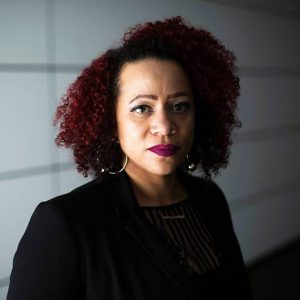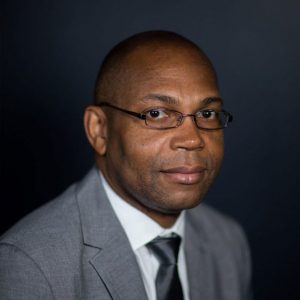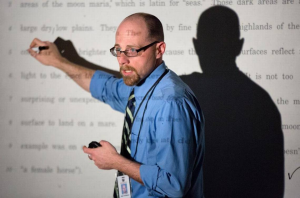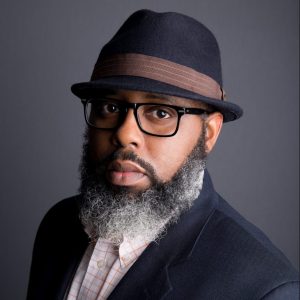PRESENTER BIOS

Nikole Hannah-Jones is a correspondent for The New York Times Magazine, focusing on racial injustice, and is a co-founder of the Ida B. Wells Society. She is also the architect of the New York Times “1619 Project,” for which she received a 2020 Pulitzer Prize. She has written on federal failures to enforce the Fair Housing Act, the resegregation of American schools, and policing in America. Hannah-Jones received the National Magazine Award, a Peabody Award, and a Polk Award for her extensive reporting on the ways segregation is maintained through official action and policy. She has a bachelor’s in history and African American Studies at the University of Notre Dame and a master’s in journalism and mass communication at the University of North Carolina at Chapel Hill.

Ron Nixon is the International Investigations Editor at the Associated Press and is a co-founder of the Ida B. Wells Society. He manages a team of reporters based in London, Cairo, New Delhi, Shanghai, and Washington. Nixon also works closely with AP reporters around the globe to conduct ambitious, investigative, and accountability reporting on a variety of topics. Previously, he was the Homeland Security Correspondent for The New York Times. Nixon has also reported from Rwanda, Uganda, Costa Rica, Guatemala, Belgium, Kenya, Canada, Senegal, Mexico, South Africa, Nigeria and the Democratic Republic of Congo. He wrote the book, “Selling Apartheid: Apartheid South Africa’s Global Propaganda War” and co-founded two major news-related startups: “The Ujima Project” and “TruthBeTold.News.” Nixon is currently a visiting associate for Journalism and Media Studies at The University of the Witwatersrand in Johannesburg, South Africa.
Topher Sanders covers race, inequality and the justice system for ProPublica. In 2019, he was part of a team that was a Pulitzer Prize finalist for Public Service and won the Peabody and George Polk awards for their coverage of President Trump’s family separation policy. In 2018, he and reporter Ben Conarck received Columbia University’s Paul Tobenkin award for outstanding reporting on race and the University of Colorado’s Al Nakkula award for outstanding police reporting for their multi-part investigation “Walking While Black.” The series explored how jaywalking citations are disproportionately given to black pedestrians. The investigation also earned a Deadline Club award, a National Association of Black Journalists’ Salute to Excellence award and the Florida Society of News Editors Gold Medal for Public Service. In 2017, Sanders and colleague Ryan Gabrielson received the John Jay College/Harry Frank Guggenheim award for excellence in criminal justice reporting and an Aronson Award for social justice journalism for their multi-part series “Busted,” an investigation of the systematic misuse of roadside chemical field tests by police. Sanders’ data-driven reporting on juvenile plea deals and the time Jacksonville juveniles spend in pre-trial detention facilities was a 2015 finalist for an Investigative Reporters and Editors award. His reporting on public-records concerns and questionable behavior by Jacksonville’s elected public defender prompted Florida Gov. Rick Scott to order an investigation of the office in 2013. The investigation resulted in a scathing grand jury report asking Scott to remove the elected official. He is a graduate of Tuskegee University and started his journalism career at The Montgomery Advertiser in Montgomery, Alabama.

Paris Miller is a member of the Orange County Community Remembrance Coalition and serves on the boards of Empowerment, Inc. & the Marian Cheek Jackson Center, Inc. in Chapel Hill. Recently, she was appointed to the Community Policing Advisory Council to the Town of Chapel Hill. Prior, Miller was an English professor at Saint Augustine’s University in Raleigh before moving abroad with her family to teach English in Abu Dhabi, UAE for four years. She also taught at the University of North Carolina at Greensboro in undergraduate studies. Miller received a master’s degree in English and School Administration at North Carolina Central University. She was born and raised in Durham, North Carolina.

Seth Kotch is the Director of the Southern Oral History Program and is an associate professor in American Studies at the University of North Carolina at Chapel Hill. He researches American history, specifically in the social history of the criminal-legal system. Kotch has produced several digital projects, including “A Red Record,” a student-driven project exploring the history of lynching in the America South, and “Mapping the Long Women’s Movement,” an experiment aimed at empowering researchers to explore oral history in new ways. Previously, he served as co-principal investigator of the “Media and the Movement” project and as a PI and project supervisor on “the Civil Rights History Project,” which is administered by the Smithsonian’s National Museum of African American History and Culture and the American Folklife Center in the Library of Congress. Kotch received his Ph.D. and master’s in history at the University of North Carolina at Chapel Hill. He also received his bachelor’s in history at Columbia University.
 Matt Scialdone is entering his 19th year in the classroom as an educator. He has spent all of those years at Middle Creek High School in Wake County where he has taught 9th grade English, African American Literature, and most recently, piloting a new course he and his students call “Hard History and Civic Engagement.” Matt holds a National Board Certification and proudly served as the 2015-16 Wake County Teacher of the Year.
Matt Scialdone is entering his 19th year in the classroom as an educator. He has spent all of those years at Middle Creek High School in Wake County where he has taught 9th grade English, African American Literature, and most recently, piloting a new course he and his students call “Hard History and Civic Engagement.” Matt holds a National Board Certification and proudly served as the 2015-16 Wake County Teacher of the Year.
 KaLa Keaton KaLa Keaton is a senior at Middle Creek High School. “Ida B. Wells Symposia” is her fourteenth event as a student speaker. Since working with the Equal Justice Initiative, she’s discussed the role of race in education, police brutality, and remote learning at multiple forums. She’s the founder and president of her school’s Social Justice Club and has collaborated with the Raleigh-Apex NAACP to produce a video in the midst of current protests. KaLa recently earned the Girl Scout Gold Award and an honorable mention for the Yale Bassett Award for Community Engagement for her activism. She’s excited to join the other panelists for this webinar!
KaLa Keaton KaLa Keaton is a senior at Middle Creek High School. “Ida B. Wells Symposia” is her fourteenth event as a student speaker. Since working with the Equal Justice Initiative, she’s discussed the role of race in education, police brutality, and remote learning at multiple forums. She’s the founder and president of her school’s Social Justice Club and has collaborated with the Raleigh-Apex NAACP to produce a video in the midst of current protests. KaLa recently earned the Girl Scout Gold Award and an honorable mention for the Yale Bassett Award for Community Engagement for her activism. She’s excited to join the other panelists for this webinar!
 Allison Jemerson is a senior at Raleigh Charter High School and member of the Freedom Struggle Committee. As part of this committee, Allison believes that we cannot be complacent about the history and repercussions of racial terror.
Allison Jemerson is a senior at Raleigh Charter High School and member of the Freedom Struggle Committee. As part of this committee, Allison believes that we cannot be complacent about the history and repercussions of racial terror.
Melani Winter is a history teacher at Raleigh Charter High School and advisor to the Freedom Struggle Committee. Originally from Milwaukee, WI, and a proud Badger, she now calls North Carolina her home.

Kathryn Hunter Williams is a teaching associate professor in Literature at UNC’s Department of Dramatic Art. As a member of PlayMakers Repertory Company, she has performed “inDoubt,” “Romeo and Juliet,” “Yellowman,” and “String of Pearls.” Williams is the performance director for Hidden Voices, a non-profit dedicated to bringing life-changing stories into a public forum. She has also worked with Living Stage, The Negro Ensemble Company, Manhattan Class Company, and New Dramatist. Williams will continue to explore the ways theater can provide insight into our differences and promote a better understanding of our community. She received her B.F.A from the University of North Carolina School of the Arts and her M.F.A from the University of North Carolina at Chapel Hill.

Joseph Jordan is the Director of the Sonja H. Stone Center for Black Culture and History at the University of North Carolina at Chapel Hill. He is also an Adjunct Associate Professor in African/African American and Diaspora Studies. Jordan’s work focuses on social justice movements and the cultural politics of race, identity, and artistic production in the diaspora. He currently serves on the Board of the Association for the Study of the Worldwide African Diaspora (ASWAD) and the Stagville (NC) State Historic Site Foundation. Jordan is Chair of the Historic Preservation Commission of Durham, NC, and a founding Board member and current advisory board member for Our Children’s Place, which is for the Children of Incarcerated Mothers. He also serves on the Editorial Advisory Boards of The Black Scholar – Journal of Black Studies and Research and PALARA – Publication of the Afro-Latin American Research Association.
 Jerry Gershenhorn is the Julius L. Chambers Professor of History and Director of Graduate Studies at North Carolina Central University. He has taught at North Carolina Central University for over twenty-five years. Previously, he has had taught at Central Carolina Community College, North Carolina A & T State University, St. Augustine’s College, and North Carolina State University. In 2007, Gershenhorn received the North Carolina Central University Award for Teaching Excellence. In the Spring of 2009, Gershenhorn was a Scholar-in-Residence at the Schomburg Center for Research in Black Culture in New York City, where he researched black scholars and the development of African Studies Programs during the early Cold War era. He appeared as an on-screen contributor and served as a consultant for the documentary film, “Herskovits at the Heart of Blackness.” Gersenhorn’s second book, Louis Austin and the Carolina Times: A Life in the Long Black Freedom Struggle (University of North Carolina Press, 2018), won the 2018 Ragan Old North State Award for Nonfiction. He earned a Ph.D. in history from the University of North Carolina at Chapel Hill. His research and teaching interests are American history, African American history, American Intellectual History, and North Carolina history.
Jerry Gershenhorn is the Julius L. Chambers Professor of History and Director of Graduate Studies at North Carolina Central University. He has taught at North Carolina Central University for over twenty-five years. Previously, he has had taught at Central Carolina Community College, North Carolina A & T State University, St. Augustine’s College, and North Carolina State University. In 2007, Gershenhorn received the North Carolina Central University Award for Teaching Excellence. In the Spring of 2009, Gershenhorn was a Scholar-in-Residence at the Schomburg Center for Research in Black Culture in New York City, where he researched black scholars and the development of African Studies Programs during the early Cold War era. He appeared as an on-screen contributor and served as a consultant for the documentary film, “Herskovits at the Heart of Blackness.” Gersenhorn’s second book, Louis Austin and the Carolina Times: A Life in the Long Black Freedom Struggle (University of North Carolina Press, 2018), won the 2018 Ragan Old North State Award for Nonfiction. He earned a Ph.D. in history from the University of North Carolina at Chapel Hill. His research and teaching interests are American history, African American history, American Intellectual History, and North Carolina history.
 Charmaine McKissick-Melton is an associate professor and former interim chair in the Department of Mass Communication at North Carolina Central University. As a public speaker, McKissick-Melton shares her experiences growing up during the civil rights movement, specifically on black empowerment, positive self-esteem, perceptions of civil rights, and the role of media in political development. Prior, she worked in communications for ten years, in radio and television sales and management. McKissick-Melton has also been active on the board of directors of many communities, businesses, and political and social awareness organizations. In 1992, she won the Coca-Cola Minority Faculty Fellowship at the University of Notre Dame, where she taught “The Civil Rights Movement and Beyond” course. McKissick-Melton was a Lyman T. Johnson Research Teaching Fellow at the University of Kentucky from 1993 to 1996, where she received her Ph.D. in communications with a focus on race relations. She is also a 2017-18 NCCU-Duke Digital Humanities Fellow. McKissick-Melton received the Board of Governor’s Teaching Excellence Award in 2017 and the NCCU Teaching Excellence Award in 2011. McKissick- received her bachelor’s in radio, television, and film at the University of North Carolina at Chapel Hill. She also received her master’s in speech communication specializing in radio, television, and film from Northern Illinois University.
Charmaine McKissick-Melton is an associate professor and former interim chair in the Department of Mass Communication at North Carolina Central University. As a public speaker, McKissick-Melton shares her experiences growing up during the civil rights movement, specifically on black empowerment, positive self-esteem, perceptions of civil rights, and the role of media in political development. Prior, she worked in communications for ten years, in radio and television sales and management. McKissick-Melton has also been active on the board of directors of many communities, businesses, and political and social awareness organizations. In 1992, she won the Coca-Cola Minority Faculty Fellowship at the University of Notre Dame, where she taught “The Civil Rights Movement and Beyond” course. McKissick-Melton was a Lyman T. Johnson Research Teaching Fellow at the University of Kentucky from 1993 to 1996, where she received her Ph.D. in communications with a focus on race relations. She is also a 2017-18 NCCU-Duke Digital Humanities Fellow. McKissick-Melton received the Board of Governor’s Teaching Excellence Award in 2017 and the NCCU Teaching Excellence Award in 2011. McKissick- received her bachelor’s in radio, television, and film at the University of North Carolina at Chapel Hill. She also received her master’s in speech communication specializing in radio, television, and film from Northern Illinois University.
 Brett Chambers is a lecturer for the Department of Mass Communication at North Carolina Central University. He is a media advocate and is passionate about showing positive images of people of color in the communications industry, as well as the classroom. Chambers serves on the Lyceum Committee, Hip Hop Initiative Advisory Group, and Jazz Research Institute Advisory Team at NCCU. He is in the National Association of Black Journalist’ Region IV Hall of Fame for his work in media over his 30-year career. He has produced and directed award-winning programs on education, health, and children’s issues at ABC’s owned station WTVD. Chambers contributed to the book, “How We Got Over: Testimonies of Faith, Hope, and Courage,” and has written for the Independent Weekly, and TRIBES Magazine. He serves as the President of the Raleigh-Durham Chapter of the National Black MBA Association, helping businesses connect with those looking for employment. Chambers has also served as Project Coordinator for a National Science Foundation funded center, Technology Enhanced Learning in Science, as well as a program director for a Department of Education TechTeach grant. He earned his bachelor’s at Duke University in public policy and his master’s at NCCU in education technology.
Brett Chambers is a lecturer for the Department of Mass Communication at North Carolina Central University. He is a media advocate and is passionate about showing positive images of people of color in the communications industry, as well as the classroom. Chambers serves on the Lyceum Committee, Hip Hop Initiative Advisory Group, and Jazz Research Institute Advisory Team at NCCU. He is in the National Association of Black Journalist’ Region IV Hall of Fame for his work in media over his 30-year career. He has produced and directed award-winning programs on education, health, and children’s issues at ABC’s owned station WTVD. Chambers contributed to the book, “How We Got Over: Testimonies of Faith, Hope, and Courage,” and has written for the Independent Weekly, and TRIBES Magazine. He serves as the President of the Raleigh-Durham Chapter of the National Black MBA Association, helping businesses connect with those looking for employment. Chambers has also served as Project Coordinator for a National Science Foundation funded center, Technology Enhanced Learning in Science, as well as a program director for a Department of Education TechTeach grant. He earned his bachelor’s at Duke University in public policy and his master’s at NCCU in education technology.
 Cash Michaels is an award-winning journalist, who is known for writing about the African American perspective in news stories around North Carolina for over 30 years. He currently writes for the newspapers: The Wilmington Journal, Carolina Peacemaker, The Carolina Times, The County News, Greater Diversity News, and The Urban News. Michaels has also written for The Amsterdam News in New York. The Brooklyn-native has experience in radio, television, and film; he produces award-winning video and documentary projects through CashWorks HD Productions, including “Pardon’s of Innocence: The Wilmington Ten” and “Obama in NC: The path to History.” Michaels worked in several small radio stations in New York and New Jersey, before moving to Durham and working at WSRC-AM, WLLE-AM, and WAUG-AM. He has also received numerous awards for his community service and work, including the NC Order of the Long Leaf Pine from North Carolina Gov. Roy Cooper. Michaels is married, has two daughters, and currently lives in Cary, North Carolina.
Cash Michaels is an award-winning journalist, who is known for writing about the African American perspective in news stories around North Carolina for over 30 years. He currently writes for the newspapers: The Wilmington Journal, Carolina Peacemaker, The Carolina Times, The County News, Greater Diversity News, and The Urban News. Michaels has also written for The Amsterdam News in New York. The Brooklyn-native has experience in radio, television, and film; he produces award-winning video and documentary projects through CashWorks HD Productions, including “Pardon’s of Innocence: The Wilmington Ten” and “Obama in NC: The path to History.” Michaels worked in several small radio stations in New York and New Jersey, before moving to Durham and working at WSRC-AM, WLLE-AM, and WAUG-AM. He has also received numerous awards for his community service and work, including the NC Order of the Long Leaf Pine from North Carolina Gov. Roy Cooper. Michaels is married, has two daughters, and currently lives in Cary, North Carolina.
De’Ivyion Drew / Yet &Still is a junior at the University of North Carolina at Chapel Hill double-majoring in studio art and in African, African American, and diaspora studies. Drew’s interest in art began when she took a clay course in her senior year of high school and soon gained the desire to work on her projects outside of class time. She is also passionate about providing positive commentary on present-day black culture. Drew describes her research as “African diaspora sculpture in action.” She uses different materials, such as brass, copper, and ivory, to create sculptures that mimic representations of African Royalty. Drew is also a part-time student at Duke University, studying African American and black studies.
 Jerry J. Wilson/ Yet & Still is a scholar, activist, and educator committed to making learning environments productive and welcoming for all students. Jerry’s work focuses on black teachers’ representation, the politics of education, civic learning, and the educational experiences of marginalized students. Before returning to graduate school, Jerry taught high school social studies in Chicago Public Schools. He is currently a Ph.D. student in Education Policy, Leadership, and School Improvement at the University of North Carolina at Chapel Hill.
Jerry J. Wilson/ Yet & Still is a scholar, activist, and educator committed to making learning environments productive and welcoming for all students. Jerry’s work focuses on black teachers’ representation, the politics of education, civic learning, and the educational experiences of marginalized students. Before returning to graduate school, Jerry taught high school social studies in Chicago Public Schools. He is currently a Ph.D. student in Education Policy, Leadership, and School Improvement at the University of North Carolina at Chapel Hill.
 Cortland Gilliam/Yet & Still is a scholar, poet, educator, and visual storyteller. He is a current doctoral candidate in Education, with a concentration in Cultural Studies and Literacies, at the University of North Carolina at Chapel Hill. In his graduate research, he studies the implications of school discipline and youth activism for greater conceptualizations of citizenship. His creative writings explore the hues and textures of racialized experiences, identities, and histories. He received his bachelor’s in science at the University of North Carolina at Chapel Hill.
Cortland Gilliam/Yet & Still is a scholar, poet, educator, and visual storyteller. He is a current doctoral candidate in Education, with a concentration in Cultural Studies and Literacies, at the University of North Carolina at Chapel Hill. In his graduate research, he studies the implications of school discipline and youth activism for greater conceptualizations of citizenship. His creative writings explore the hues and textures of racialized experiences, identities, and histories. He received his bachelor’s in science at the University of North Carolina at Chapel Hill.


